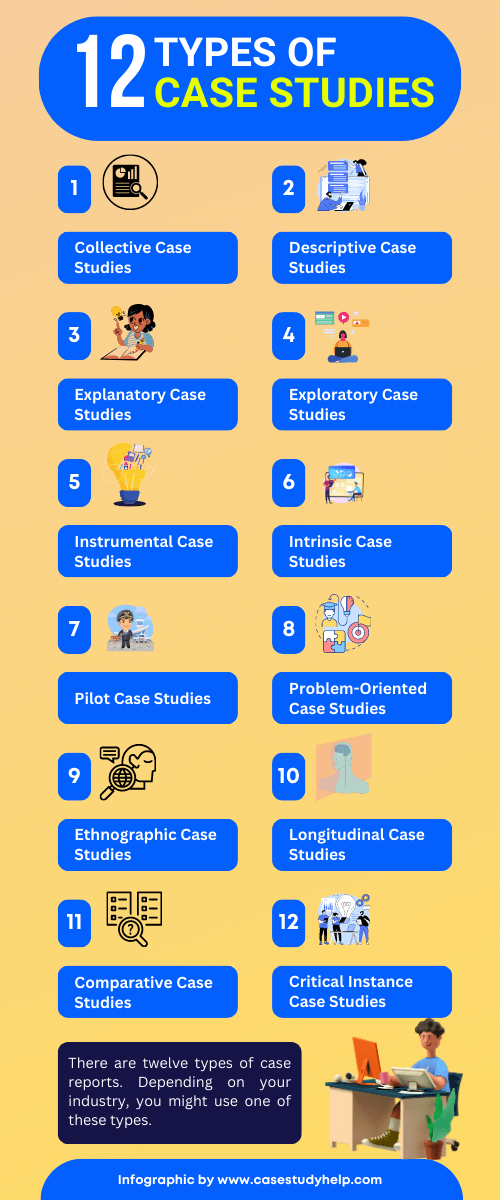What Is the Definition of a Case Study?
A case study is typically a research paper to generate an in-depth and multi-faced understanding of any complicated issue in a life scenario. It is a well-written research design that is very commonly used in a wide range of disciplines.
Looking for fast and professional case study assignment help online? Choose Casestudyhelp.com and enjoy high-quality case study assistance and the lowest rate!
Also Read: A Complete Guide to Writing an Effective Case Study
Case Study Examples
- Marketing case study examples: Case studies in marketing are written to show your success, and you must always prominently showcase your buoyant suits. You can use bright, bold colours with many contesting fonts, shapes, and simple icons to highlight your case study.
- You need to highlight your big win on the 2nd page with a bright orange colour with highlighted circles.
- Make the essential data stand out exceptionally to track your prospective customers.
- Marketing all the critical data is very important in your marketing case study.
Use a straightforward and crystal clear layout of the case study.
- Using a straightforward layout in any case study is very effective. For example, keeping a spotless white background and drawing slim lines helps to separate these sections in a specific way for formatting the case study.
- Making the information clear helps draw attention to the results and helps to improve the accessibility of the design.
- The case study examples must sit nicely with more extended reports and a consistent layout.
Need Help with Writing a Case Study?
Casestudyhelp.com is the right place that can help you.
What Are the Types of Case Studies?
Case studies can be categorized into several types based on their focus and purpose. Here are some common types of case studies:
- Collective Case Studies: These types of case studies involve investigating any group of individuals. Here, the researchers need to study a group of people in a specific setting or any community. Ex: Psychologists must explore how access to the resources in any society can affect people’s mental wellness.
- Descriptive Case Studies: These involve starting with any descriptive theory. The subjects are then observed, and the gathered information is compared to the preexisting approaches.
- Explanatory Case Studies: These types of case studies are primarily used to conduct any casual investigation. Here, the researchers are more interested in looking for the factors that caused specific results.
- Exploratory Case Studies: These case studies are conducted when researchers want to explore a new or relatively unexplored topic. They are more open-ended and aim to generate hypotheses and ideas for further research.
- Instrumental Case Studies: These case studies are selected because they provide insights into a broader issue or theory. The case is used as a means to investigate a more general phenomenon.
- Intrinsic Case Studies: In these case studies, the case itself is of particular interest due to its uniqueness or rarity. The goal is not to generalize findings to a larger population but to understand the specific case deeply.
- Pilot Case Studies: Pilot case studies are conducted as a preliminary investigation before launching a larger study. They help researchers refine their research questions, methods, and procedures.
- Problem-Oriented Case Studies: These case studies focus on solving a specific problem or addressing a particular issue. Researchers aim to provide practical solutions based on their analysis of the case.
- Ethnographic Case Studies: Ethnographic case studies involve immersing the researcher in the subject’s environment to gain an in-depth cultural understanding. This is often used in anthropology and sociology.
- Longitudinal Case Studies: Longitudinal studies involve observing and analyzing a case over an extended period of time. This allows researchers to track changes, developments, and trends that occur over time.
- Comparative Case Studies: Comparative case studies involve comparing two or more cases to draw similarities, differences, and patterns between them. This type of study is often used to test hypotheses or theories.
- Critical Instance Case Studies: Critical instance cases are chosen because they represent a crucial or pivotal event that can provide insights into a larger issue or theory.
Each type of case study serves a different purpose and is designed to answer specific research questions. Researchers choose the type of case study that best aligns with their objectives and the nature of the phenomenon they are investigating.
Also, Check Out – Why Is Everyone Talking About Case Study Help?
What Are the Methods of a Case Study?
A case study research is a qualitative research design. It is often used in the social sciences since it involves observing the cases or subjects in their settings with the most minor interference from the researcher.
In the case study method, the researchers pose a definite question raging any individual or group for testing their hypotheses or theories. This is done by gathering data from the interviews with the essential data.
Case study research is a perfect way to understand the nuances of any matter often neglected in quantitative research methods. A case study is distinct from any other qualitative study in the following ways:
- Focused on the effect of any set of circumstances in any group or any individual
- It mostly begins with any specific question regarding one or more cases
- It usually focuses on the individual accounts and its experiences
The primary features of case study research methods are as follows:
- The case study methods must involve the researcher asking a few questions of one person or a small group of people who are known as the respondents for testing the survey.
- The case study in the research mythology might apply triangulation to collect data. It is then analyzed and interpreted to form a hypothesis to be tested through further research or validated by other researchers.
- Concepts are defined using objective language with references to the Preconceived Notions. These individuals may have about them. A researcher sets out to discover by asking any specific question on how people think about their findings.
- The case study method needs a clear concept and theory to guide the processes. A well-organized research question is fundamental while conducting any case study since its results depend on it. The best approach for answering the research questions is challenging the preexisting theories, assumptions or hypotheses.
Benefits and Limitations of Case Studies
The benefits of case studies are as follows:
- Case studies give many details to be collected and will be easily obtained by the other research designs. The collected data is mostly richer than that can be funded via different experimental methods.
- Case studies are primarily conducted on the rare cases where more extensive samples of similar participants are unavailable.
- Within certain case studies, scientific experiments can also be conducted.
- The case studies can also help the experimenters adapt the ideas and produce novel hypotheses for later testing.
Disadvantages of Case Studies
- One of the main criticisms in case studies is that the collected data cannot necessarily be generated for any broader population. This can lead to data being collected over any case study that is only sometimes relevant or useful.
- Some of the case studies still need to be scientific. Many scientists used case studies for conducting several experiments, the results of which were only sometimes very successful.
- Case studies are primarily based on one person, so it can be only one experimenter who is collecting the data. This can lead to a bias in data collection that can influence the results in frequent designs.
- Drawing any definite cause or effect from many case studies is sometimes challenging.
Importance of Case Study
- A case study is a particular research h method involving an up-close and in-depth investigation of any subject, and it is related to a contextual position. These are produced by following a research form. The case study helps in bringing the understanding of any complex issue. This can extend experience or add strength to the already existing knowledge via the previous research. The contextual analysis revolves around a small number of events or situations.
- Researchers have used case studies for an extended period, and they have been successfully applied in various disciplines like social sciences.
Writing the best case study paper on any subject is a challenging task. Thus, you will always need the best service provider in this regard. The CaseStudyHelp.com is the top choice for you.
A Word from CaseStudyHelp
- We are the top choice for you to write a case study. Always provide the best case study examples for students
- 24×7 hours of support are available via our website
- Our experts always assure you of the top grades
- The service charges are also quite reasonable
Thus, could you register with us soon?



